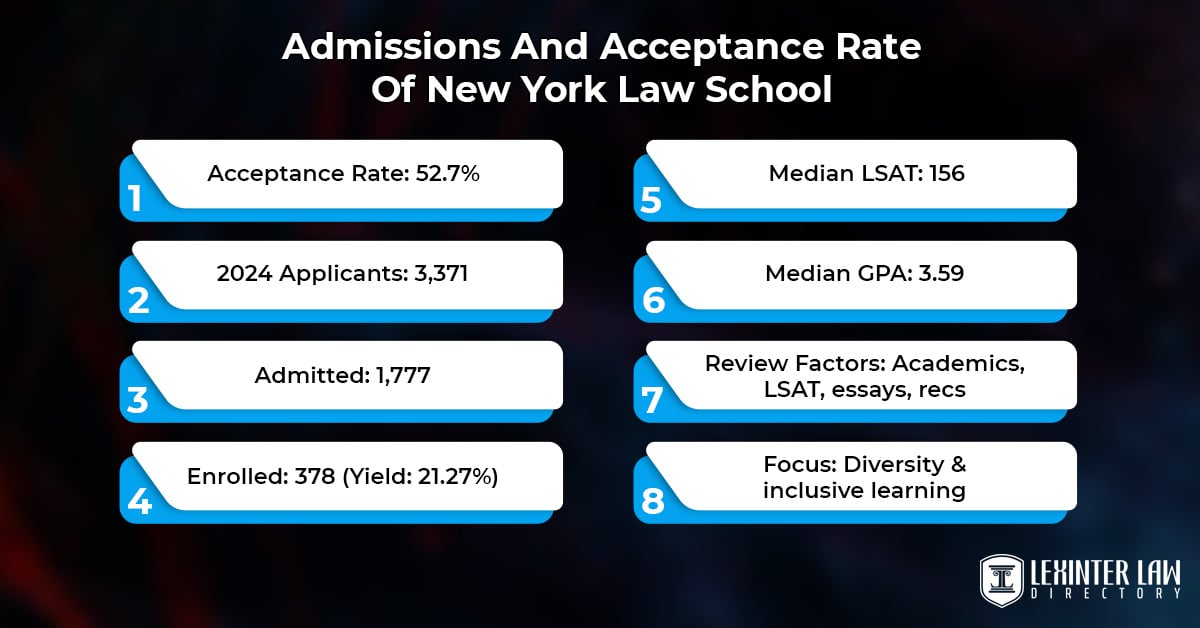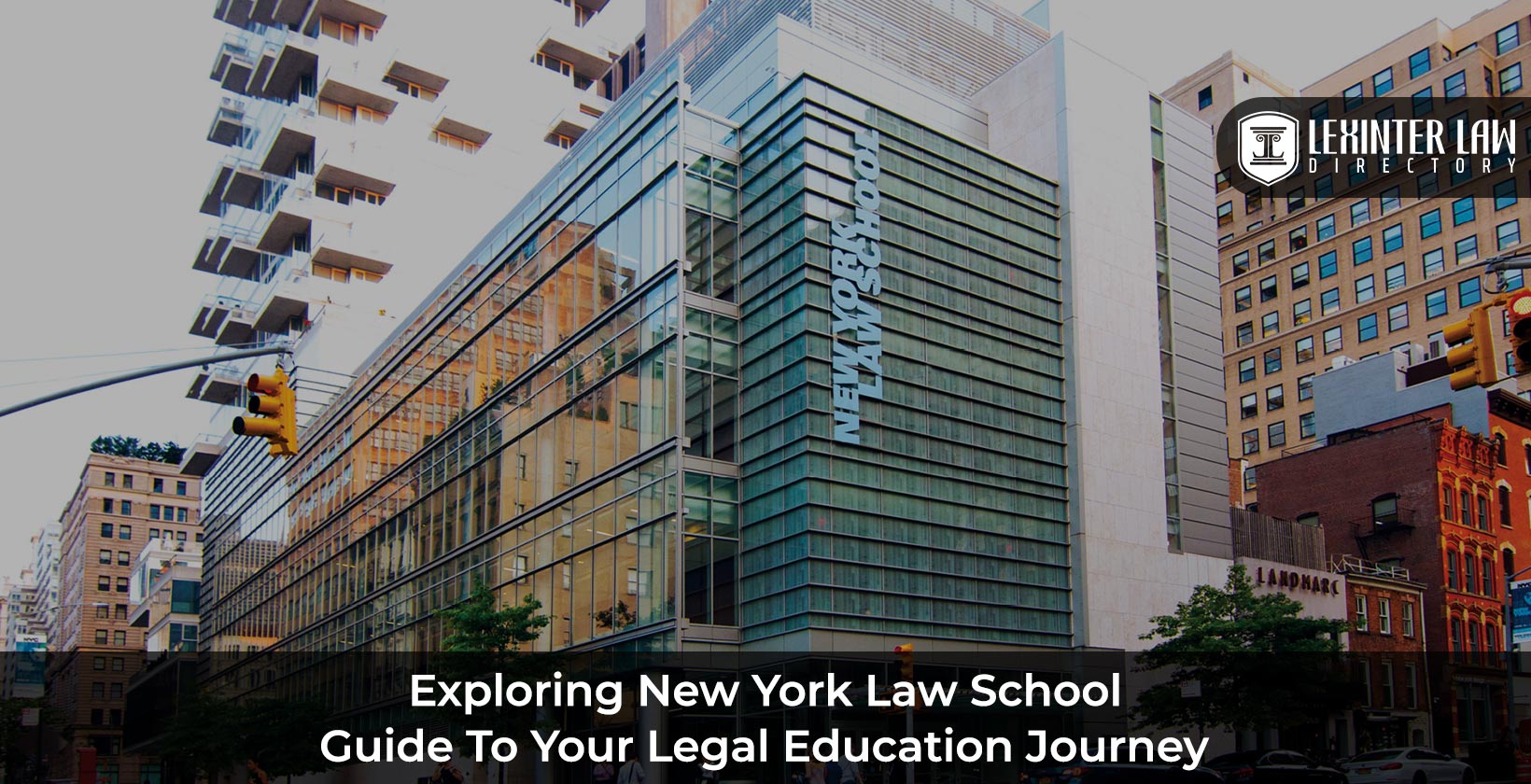Exploring New York Law School: Guide To Your Legal Education Journey
Are you dreaming of a legal career in the heart of New York City? New York Law School (NYLS), established in 1891, has built a legacy of producing practice-ready lawyers with a passion for justice. Renowned for its focus on public interest law, innovation, and experiential learning, NYLS blends academic rigor with real-world application.
Located in Manhattan’s legal and financial hub, the school offers students unparalleled access to courts, firms, and public institutions. With a commitment to diversity and social impact, it remains a top choice for aspiring legal professionals.
In this article, we’ll explore key aspects of NYLS—including its acceptance rate, national rankings, academic programs, campus experience, and the career opportunities it opens for future legal leaders.
Table of Contents
Facts To Know About New York Law School
New York Law School offers a dynamic legal education in Manhattan, emphasizing experiential learning, diversity, and public interest. With strong employment outcomes and renowned faculty, NYLS equips students for successful, impactful legal careers.
Location And Campus
Situated in the heart of Manhattan, New York Law School boasts a prime location at 185 West Broadway, New York, NY. Its campus exudes an atmosphere of intellectual vigor and legal scholarship. The school’s facilities are designed to facilitate an optimal learning environment.
The Arthur Salomon Library, the school’s main library, is renowned for its extensive collection of legal resources. It offers students access to a vast array of legal texts, journals, and electronic databases, supporting their research endeavors.
New York Law School is situated in the heart of New York City and benefits from its proximity to various legal institutions, offering students unique opportunities for practical learning. Students can engage with the bustling legal community through internships, externships, and networking events, gaining valuable hands-on experience.
Academic Programs And Curriculum
New York Law School offers a diverse range of academic programs to suit the needs and aspirations of its students. The flagship program is the Juris Doctor (JD), an 86-credit curriculum combining legal theory with practical training. Students can choose from the Full-Time Day Division, Part-Time Evening Division (NYLS Pro), or the Accelerated Two-Year J.D. Honors Program, providing flexibility in how they pursue their legal education.
NYLS stands out for its innovative “Think BIG” curriculum, which lets students specialize in Business and Financial Services, Intellectual Property and Technology, and Government and Public Interest Law. This pathway approach aligns education with professional goals, helping students focus their legal training early on.
The school emphasizes experiential learning through extensive clinics, externships, and simulation-based courses. Joint and advanced degree options offer interdisciplinary opportunities, like the J.D./M.A. in Forensic Psychology and the LL.M. in Taxation. With 250+ electives and a practice-driven faculty, NYLS prepares students for real-world legal careers.
Admissions And Acceptance Rate

Applicants undergo a rigorous selection process to gain admission to New York Law School. This reputed law school carefully evaluates each candidate based on their academic achievements, personal statements, letters of recommendation, and LSAT scores.
The acceptance rate at New York Law School currently stands at approximately 52.7%, based on the most recent admissions cycle. In 2024, the school received 3,371 applications and extended offers to 1,777 students, reflecting consistent interest in the institution. Of those admitted, 378 students enrolled, resulting in an enrollment yield of 21.27%—a testament to NYLS’s growing appeal.
Admitted students typically present strong academic credentials. The median LSAT score is 156, and the median undergraduate GPA is 3.59, marking a slight increase over previous years. NYLS continues to foster a diverse and inclusive student body, welcoming individuals from varied backgrounds, cultures, and experiences to enrich the learning environment.
The student profile at New York Law School is characterized by diversity. The institution prides itself on its commitment to fostering an inclusive learning environment, welcoming students from diverse backgrounds.
Rankings And Reputation
According to the most recent U.S. News & World Report rankings for 2025, New York Law School is ranked 121st among law schools in the United States. In addition, the school holds a strong reputation in several specialty areas, including a notable position in Part-Time Law programs, further highlighting its flexibility and appeal to working professionals.
New York Law School’s faculty is widely respected for their academic excellence and real-world experience. Their contributions to legal scholarship and innovation enhance the school’s reputation for delivering a forward-thinking legal education. NYLS has also been recognized by preLaw Magazine as one of the top law schools for diversity, reflecting its inclusive environment.
The institution’s longstanding commitment to public interest law and social justice remains a cornerstone of its identity. Through clinical programs and community engagement, NYLS continues to earn respect for producing graduates dedicated to meaningful, service-driven legal careers.
Career Prospects And Alumni
According to the most recent statistics, this prestigious law school boasts a strong job placement rate, with approximately 90% of graduates securing employment within ten months of graduation.
According to the latest data, 94% of the Class of 2024 secured employment within ten months of graduation, with 90% working in “gold standard” positions requiring bar passage or providing a JD advantage. Graduates commonly pursue careers in private law firms, corporate legal departments, government agencies, and public interest organizations.
Notably, around 65% of employed graduates entered private practice, and 29% joined large firms with over 500 attorneys, highlighting the school’s growing presence in competitive legal markets.
NYLS’s vibrant alumni network plays a key role in student success. Distinguished alumni include former New York City Mayor John Lindsay and Judge Judith Sheindlin, widely recognized as Judge Judy. These connections open doors for students through valuable opportunities such as internships, clerkships, and professional mentorships, all strengthened by the school’s location in the heart of New York City’s legal hub.
FAQs
1. Is New York Law School Hard To Get Into?
New York Law School is moderately selective, with an acceptance rate of approximately 52.7%. While it’s not among the most competitive law schools, applicants still need a solid academic background, a strong LSAT score, and compelling personal materials to gain admission. Preparation and fit with NYLS’s mission are key.
2. Is New York Law School A Good Law School?
Yes, New York Law School is highly regarded for its rigorous academic programs, commitment to public interest law, and social justice advocacy. Its distinguished faculty, extensive alumni network, and excellent job placement rates contribute to its reputation as a leading law school.
3. What GPA Do You Need To Get Into New York Law School?
To gain admission to New York Law School, applicants typically need a strong academic record. The median undergraduate GPA for admitted students is around 3.59. While there is no official minimum, a GPA above 3.3 enhances your chances, especially when paired with a competitive LSAT score and solid application.
Conclusion
New York Law School, with its commitment to social justice, offers a distinct legal education experience. Situated at the heart of the legal hub of the U.S., its students receive the unique opportunity to learn from experienced faculty while also gaining hands-on experience.
By choosing NYLS, students embark on a transformative journey, equipping them with the skills, knowledge, and network needed to make a significant impact in their chosen field of law.

